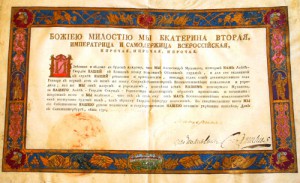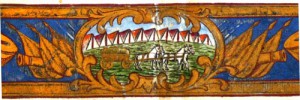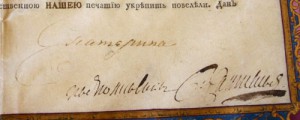by Alla Barabtarlo
June 2006
I. The Charter
Preserved in the Rare Book Collections is a very curious document – a beautiful two-hundred-and-sixteen year-old charter endorsed by the Russian Empress Catherine the Great, that promotes Aleksandr Mukhanov, a young Russian nobleman, from regimental baggage-train driver to Lieutenant-Captain (Secund-Rotmistr) in the Horse-Mounted Guards.

Click image to enlarge
This unique document – likely acquired "somewhere in the 1920s" within a large and important collection of books and documents purchased for the University Library – is printed on parchment with a hand-painted border of cobalt blue. There is a monogram of Catherine the Great at the center of the top border, surrounded by double-headed crowned birds, banners, firearms and cold steel, armor, and bows and quivers.

Click image to enlarge
In each corner there is a helmet with a plume decorated with oriental ornaments and an allegorical figure of Minerva on the left hand side and one of Mars on the right. At the bottom of the border, in a medallion, one can see a military transport and two pairs of horses, surrounded by banners, cannon, cartridge pouches and drums.

Click image to enlarge
The text itself starts with a six-line ornamental initial. The document carries traces of the Russian Imperial wax seal.
Literal Translation of the Charter:
By the Grace of God, We, Catherine the Second, Empress and Autocratrix of All the Russians, &c, &c, &c.
Let it be known and recognized by all that as of the first day of the month of January, in the year of Our Lord one thousand-seven hundred-and-ninetieth, We have Most Graciously bestowed and conferred upon Aleksandr Mukhanov who had served Us as regiment baggage-train driver in the Horse-Mounted regiment of Our Guards, and in acknowledgement of the zeal and diligence with which he disposed of his duty in Our service, – the rank of Lieutenant-Captain in the self-same regiment; and whereas We bestow and confer this upon him, commanding all Our men to pay the said Mukhanov the honors and respect befitting the rank of Our Lieutenant-Captain in the Guards, are accordingly trustful that in this rank, most Graciously granted him by Us, he will deport himself in a manner that behooves a loyal Officer of the Guards. In testimony thereof We have signed this with Our own Hand and commanded that it be confirmed by Our State Seal.
Given in Saint Petersburg, in the year 1790, {on the 24th Day of December}
Signed
Catherine.

Click image to enlarge
On the lower line there is a signature, by a different hand: Lieutenant-Colonel {Saltykov} of the Guards Horse Mounted Regiment.
Almost everything in this document raises questions: Who was Mukhanov, and why was he so abruptly promoted from the lowest ranks to a position of high prestige? If the promotion was effective as of January 1st 1790, why was the order signed almost a year later, on Christmas Eve of 1790? What happened to Mukhanov later? How did the original document find its way to mid-Missouri? These are among the many baffling questions to which we may never have a definite answer, but a bit of detective work can cast some light upon the mysteries of the past.
II. Our hero – Mukhanov
Aleksandr Il'ich Mukhanov was born on January 8, 1766 into a noble family. He had six brothers and one sister. His father, Il’ia Mukhanov, was a Colonel in the Horse-Mounted Regiment, from which he retired in 1764, and he was personally known to the Empress. On the day of her ascension to the throne as a result of a coup – July 28th 1762 – Il'ia Mukhanov was among the officers in her convoy on the way to St. Petersburg.
When the future Empress felt cold, Il'ia Mukhanov gave her his officer's overcoat. She always remembered this gesture with gratitude.
According to the memoirs of Aleksandr Mukhanov's niece, five older brothers were educated at home, and the youngest one, Michael, at the Military School. All of them served at the same Life-Guards regiment. And as a contemporary anecdote has it, some pupils of the convent school for young noble ladies thought that all Life-Guards were named Mukhanov. Honesty, piety, and familial loyalty were among the young men's virtues, according to Mukhanov's niece.
Aleksandr Mukhanov joined the regiment in 1775, at the age of 9. It was customary in 18th-century Russia to enlist a boy of noble birth in a regiment as a soldier, so that when he came of age he would be ready to receive his first officer's commission and to begin his real service in a regiment
If we look at the list of his promotions, we can see that he was first promoted to a cornet in 1784, at the age of 18 . He was promoted again in 1792 to a captain (rotmistr), and on November 15, 1796, only nine days after Catherine's death, he became colonel and was decorated with the Order of St. Anne.
After Catherine's son Paul ascended to the throne, Mukhanov's career took a sharp upswing. In March of 1798, two month after his first son Paul was born, Mukhanov retired from the Guards and was given a civil rank of State Councilor (slightly higher than colonel), became a Knight Commander of the Order of St. John of Jerusalem, and on September 5th, was appointed Vice Governor of the city of Novgorod. He was advanced to an Actual State Councilor (corresponds to a Major General) and then appointed Governor of Kazan, the capital of an important province, on April 4, 1799. After Emperor Paul's assassination in 1801, Aleksandr Mukhanov was relieved of his governorship and brought before the Senate for trial on charges of cruelties committed while governor of Kazan. He was 35 years old.
But it was not the end of his career. On May 6, 1805, he was sent to the south of Russia to be a civil governor of Poltava, and in the following year he became a civil governor of Riazan. Later he returned to St. Petersburg, and received a rank of Stalmeister at the Imperial Court (Master of the Horse), which, according to the Russian Table of Ranks, corresponded to the rank of Lieutenant General. He spent the last years of his life in Moscow, where he died, and was buried in the cemetery of Novodevichii Convent on October 22, 1815.
III. A Christmas Gift
It can only be conjectured that at the end of 1789 Mukhanov was ready for the promotion to the rank of second-lieutenant, when something happened that impeded his rising through the ranks of the regiment.
These and other considerations lead to the supposition that the whole matter of the demotion and promotion of Aleksandr Mukhanov could be to a certain extent a domestic affair for Catherine, who could be moralistic but was more-or-less good-natured.
The older the Empress grew, the younger her lovers became. But in this case one can be reasonably certain that nothing remotely resembling a romance played any part in Mukhanov’s misfortune and subsequent recovery. For the simple reason that Catherine’s son, Emperor Paul, disliked his mother so much (after she had his royal father deposed and strangled), and hated her lovers with such vehemence, that once he had gained the throne himself, he repaid them in kind, trying to undo everything his mother did, and variously rewarding anyone who had previously had the courage, or simply the misfortune, ever to cross one of those powerful favorites. It was at this time that Paul started piling his favors upon Mukhanov almost the day after he had become the Emperor; thus, one might safely assume that Mukhanov, far from being intimate with Catherine, quite likely had stepped on a toe or two within her inner circle, and suffered the consequences – until the Empress took pity on him.
In the case of Aleksandr Mukhanov it looks as if he was punished by a firm but benevolent, almost motherly hand, and when he showed (perhaps) genuine regret, or demonstrated extraordinary courage on the battlefield (maybe), he was generously rewarded: promoted not to the next higher rank, but over two ranks, and evidently received a year-worth salary of a Lieutenant-Captain in back pay to boot! Above all it was a nice Christmas gift: there was a blank at the end of the charter, filled in longhand when it was signed: December the 24th.
Postscript
This was the end of the document, but not of the story. Our hero's great-grandson Bakhmetiev served as the last Russian ambassador in the United States, and after the Bolshevik coup never returned home. He married an American, Mamie Beale, and one hopes they lived long and happily. Curiously enough, another person related to our university – David Francis – was at the same time the very last American ambassador to the Russian Empire.